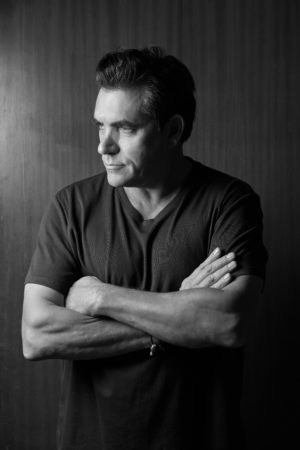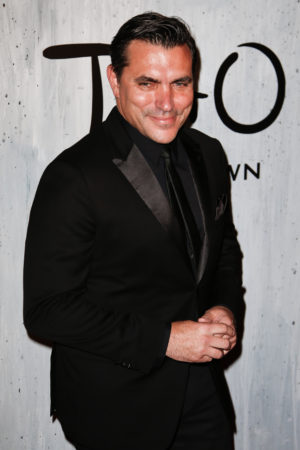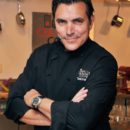One thing the most enduring and relevant chefs have in common is that they are early risers who never shy away from staying as late as necessary to ensure their game is on point, every order is consistent, and their kitchen team puts in a cohesive effort. This is certainly true of Todd English, who entered his first professional kitchen at age 15 and became a star student at the Culinary Institute of America, graduating in 1982 with honors. Armed with that experience, the young chef refined his craft at New York’s La Côte Basque under the tutelage of chef Jean-Jacques Rachou. From there, English dug deeper into his ancestral roots by apprenticing at Dal Pescatore in Canneto sull’Oglio and Paracucchi in Locanda dell’Angelo, two of Italy’s most esteemed restaurants.
And all before the age of 25.
“I think one of the things I love about food is that it has always been our greatest form of democracy,” muses English, speaking with humility about what brought him into a famously challenging vocation. “Food brings about peace and love, and creates nurturers among those of us who do this for a living. I want to always remember that the best places I have been and the best times that I’ve had involve being around the table breaking bread with other people. While bringing people together and enjoying something doesn’t have to be complicated, [being a successful chef] has to be rooted in one’s passion for food and wine.”
Upon his return from Italy, English began a three-year run as executive chef of Michela’s in Cambridge, Mass., renowned for its Northern Italian cuisine, before opening Olives in Boston’s Charlestown neighborhood in 1989. His bold approach to simple, rustic cuisine did more than delight selective diners. The James Beard Foundation named him its “National Rising Star Chef” in 1991, and by 1994, “Best Chef in the Northeast.” Nation’s Restaurant News named English one of the Top 50 Tastemakers in 1999. It can be argued that English became the prototype of the modern celebrity chef in 2001, garnering the titles of Bon Appetit’s “Restaurateur of the Year” and one of People Magazine’s “50 Most Beautiful People.”
English’s lifetime membership in the league of culinary rock stars is secure, and it is underscored with his inclusion in the James Beard Foundation’s “Who’s Who in Food and Beverage”; restaurants along the Eastern Seaboard as well as Las Vegas, Florida, and the Philippines; a cookware collection; cookbooks; and his own PBS culinary travel show, Food Trip With Todd English. Through the highs and lows of his career, he remains thoughtful and circumspect when pondering what keeps his professional fires burning and how the industry has changed.

Todd English, courtesy of Jan Mayo
WHAT’S THE LAST THING YOU MADE FOR DINNER?
Spaghetti aglio e olio [oil and garlic]. It’s a classic I never get tired of, although it reflects that simpler is harder to do.
IS THERE A FOOD OR RECIPE THAT BEST REPRESENTS THE SIMPLICITY AND AUTHENTICITY OF ITALIAN CUISINE?
What resonates near and dear in my heart are really simple things such as a beef carpaccio dish I did at Olives, as well as a number of vegetable dishes. I love a very simple tomato sauce. While I can’t say there’s one specific food or recipe that captures this, simpler is what I always go for.
HOW DO YOU FEEL ABOUT STAYING RELEVANT AS CULINARY TRENDS ARE GOING IN DIFFERENT DIRECTIONS?
My kitchen teams and I have been actually rewinding. Even though I have lived through an era of very sophisticated techniques when it comes to the kitchen—such as molecular cuisine and all of these incredible, innovative systems of cooking—we are going back to simplicity as it has been done in Italy for generations. I think the best place to start a recipe is with buying the best possible ingredients, as you can achieve a good result by doing the least to them.
As far as “perfection” goes in the restaurant world or at home, there are many definitions. However, I define it in terms of looking for that perfect moment when the dish is truly ready to serve. From my grandmother, I learned cooking is about timing. She knew exactly when to pull the dish off the stove or out of the oven, and she knew when it was perfectly done. I never forgot that, as well as the fact that some dishes with only three or five ingredients, glued together with olive oil, salt, and pepper, can bring out the “wow” when timing and inner knowledge of what works is applied. It’s like music.

Chef Todd English attends the grand opening of TAO Downtown at the Maritime Hotel
HOW FAR BACK IN YOUR CHILDHOOD DID YOU REALIZE YOU WANTED TO WORK AS A CHEF, AND WHO WERE YOUR EARLIEST INFLUENCES?
Let’s just say that, as a child, garlic, oregano, and olive oil heating up in a pan and anchovies were very much a part of my life. I have childhood memories of my grandmother making rabbit cacciatore in a Dutch oven in the fireplace, and this was the best thing I had ever eaten in my young life. And who cooked rabbit in the ’70s in America? Probably nobody. You had to have an Italian grandmother to do it. Although we didn’t have a lot of money, we would be at their house in the countryside of Connecticut. My uncle hunted, and sometimes we would have whatever he caught, or just the old style of stretching food and making it delicious, even at a young age.
I have great memories of their homemade wine, and of making polenta and all these crazy dishes that I still have on some of my menus today, very much based on how I remember how they were cooked. I guess somewhere in the back of my mind, it sunk in and I loved doing it. That said, [becoming a chef] wasn’t a career that a young American kid thought about.
WHO WAS YOUR FAVORITE ROLE MODEL OR MENTOR BEYOND YOUR IMMEDIATE FAMILY?
We used to watch a lot of Julia Child on PBS growing up, so perhaps that provided inspiration. She later became a mentor to me as well, which is just by lucky coincidence. I lived in Boston, and I was very fortunate that I had a lot of good culinary people around me. That said, I also think Nadia Santini at Dal Pescatore in Canneto sull’Oglio in the Montava region of Italy had a deep influence on me as well. Nadia taught me an enormous amount about the cooking of her region, in the kind of place where you went to the hen house when you needed an egg. I regard her in some ways as family, as I went back about five years ago with my kids and my girlfriend. I walked into the kitchen and it was very busy … yet she turned around, her drawers open, and we both started crying. Nadia’s boys were 4 and 5 years old when I met them, and when I went back there, they were running the dining room.
YOUR ADULT CHILDREN WORK IN THE FOOD BUSINESS IN DIFFERENT CAPACITIES. WHAT WOULD YOU SAY IS THE BIGGEST DIFFERENCE BETWEEN THE TIME THAT YOU STARTED AND THEIR PATH?
My sons are documentary filmmakers, noted for the award-winning Feeding Tomorrow, while my daughter is a test kitchen culinary director at Williams-Sonoma. Through their experience especially, I think that what we’re seeing now is that the public wants to know what they’re putting in their bodies and into their food, especially on the West Coast. We’re seeing more people pay attention to where food comes from, and yet there’s certainly much more education around it and much more awareness, which is great.
For my part, I always try to work with local farmers, including areas just outside Boston or New York as the farms remind me a lot about how things worked in Italy and elsewhere in Europe when I was younger. I always found it interesting that years ago when you went to the markets in Italy, you would find all kinds of organic food, but they didn’t have to label it as organic.
WHAT’S THE SECRET TO PULLING TOGETHER A SOLID, COHESIVE KITCHEN TEAM?
No matter where you are, [success] is about making sure you have the right team around you. You need to make sure you treat the people you work with right, nurture their passion for food, and let them know you are in this effort together. Being able to find those people who really love what they do is absolutely the most important thing—it’s about their love for what they do and how they passionately express it.
DO YOU HAVE ANY PLANS FOR NEW OPENINGS? WHAT’S NEXT?
I feel like, as we are coming out of a pandemic, the time is right to be exploring opportunities to educate the public in ways that touch on health and wellness. Through recipes and discourse, getting the message out that our health is our wealth and food is our medicine. From there, I hope [through books, television, lectures, and other mediums] to discuss food in a way that brings people back to basics, but without getting pedantic about it. How can natural things such as herbal remedies and conservation make us better people? I am very excited about this superfood thing that I’m working on. That’s sort of where I’m at.














































